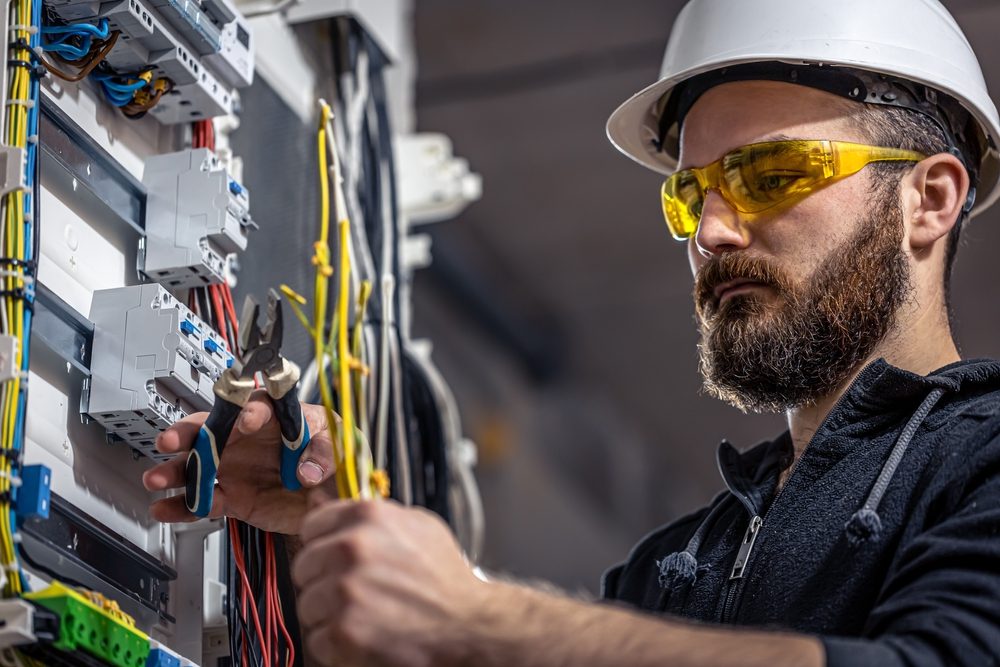Homeowners in Charlotte face a common fork in the road: call a licensed electrician or hire a handyman for a small electrical fix. The choice looks simple until a tripped breaker becomes a scorched outlet, or a “quick swap” reveals an overloaded circuit. This article explains the real differences, typical costs in the Charlotte area, and when a professional electrical repair service protects both your budget and your house.
What separates a licensed electrician from a handyman
A licensed electrician in North Carolina holds a state license, carries liability insurance, and follows NEC and Mecklenburg County code. That license matters when the work involves load calculations, panel diagnostics, grounding, GFCI/AFCI protection, aluminum wiring, or anything inside a live panel. A handyman can be helpful for carpentry and general maintenance, but electrical systems demand training and testing that address fire risk and shock hazards.
Homeowners often assume a handyman can handle “simple” outlet swaps. Many can. The risk shows up with older homes in neighborhoods like Plaza Midwood, Dilworth, Elizabeth, and NoDa, where mixed wiring methods, bootleg grounds, or shared neutrals are common. A licensed electrician recognizes electrical repair Charlotte NC those patterns, tests correctly, and fixes the root cause before it turns into repeat failures.
What electrical repairs typically cost in Charlotte
Rates vary by scope, parts, and access, but a local range helps set expectations. The figures below reflect common pricing our team sees across South End, Steele Creek, University City, Ballantyne, and Matthews. If a wall is difficult to access, if the circuit is aluminum, or if code upgrades are required, expect the high end or higher.
- Service call and diagnostic: $89 to $159 in most Charlotte zip codes. Many companies apply part of this fee to the repair if approved on the spot. Standard receptacle replacement (existing box, copper wiring): $95 to $180 per outlet for parts, labor, and testing. GFCI devices typically land at $145 to $225 each, depending on brand and tamper/weather resistance. Light switch replacement: $95 to $170 for standard, $165 to $300 for dimmers or smart switches, plus hub setup if needed. Circuit breaker replacement: $150 to $300 for standard thermal-magnetic breakers; $220 to $420 for AFCI/GFCI combo breakers based on panel type and availability. Loose connection or half-dead circuit troubleshooting: $150 to $450, driven by time tracing the fault. New dedicated circuit for appliances or EV chargers: $450 to $1,200 for shorter runs; $1,200 to $2,500 for longer pulls, panel upgrades, or trenching.
These are working ranges, not quotes. An on-site diagnostic is the only way to confirm the exact scope, especially in older homes near Myers Park or Wilmore where wiring history varies by renovation.
When a handyman makes sense — and when to call an electrician
There are quick wins for a handyman, like swapping a faceplate, installing a battery-powered doorbell, or rehanging a light fixture on an existing, healthy box. The gray area emerges when a light flickers after installation, a breaker trips after a new microwave, or an outlet sparks when a vacuum starts. Those are load, connection, or grounding problems, and they need proper testing equipment and training.
A few examples from Charlotte homes illustrate the difference. A townhome in SouthPark had tripping GFCIs on a bathroom circuit. A handyman replaced two outlets, but the trips continued. A licensed electrician traced the issue to a shared neutral on a multi-wire branch circuit. The fix required reconfiguring the breaker handle tie and separating neutrals in the panel. Another case in an older bungalow near Wesley Heights involved a warm outlet. The homeowner planned a simple swap, but heat signatures on a thermal camera showed a loose backstabbed connection upstream. Rewiring to the screw terminals and moving the load off a daisy-chained device stopped the heat and the intermittent power loss. Those are not cosmetic fixes; they are safety-critical.
Outlet replacements: what drives price and what to ask
Outlet costs hinge on device type, wiring, and protection needs. Standard 15A tamper-resistant outlets come in at a modest price. GFCIs cost more, and combination USB or smart receptacles add parts cost and sometimes box depth issues. In kitchens and bathrooms, code requires GFCI protection. In bedrooms, many Charlotte homes now use AFCI or dual-function breakers to meet code. If a panel cannot accept AFCI/GFCI breakers, the protection may move to the first device in the run, which can affect labor time.
Good questions for any provider:
- Will this outlet require GFCI or AFCI protection based on location and current code? Is the box grounded, and is the neutral intact? Is the device backstabbed or secured to the screw terminals? Is aluminum wiring present, and will COPALUM or AlumiConn connectors be needed? Will you test line/load orientation and trip the GFCI after installation?
Those answers reveal whether the work is a true like-for-like swap or a minor project with real safety implications.
What drives cost beyond the parts
Homeowners see a $20 GFCI at the store and wonder why the invoice is higher. The difference is the service. A professional electrical repair service includes drive time across Charlotte traffic, ladders, PPE, test instruments, insurance, permit knowledge, and a skilled person who can identify hazards and stand behind the work. Diagnostic time can exceed the fix itself, especially on intermittent faults. Panel brand also matters. Some legacy panels in older Charlotte homes require specialty breakers that cost more or demand a safe, code-compliant workaround.
Symptoms that point to a licensed electrician
Light dimming when a microwave or space heater runs suggests a loaded circuit or a weak connection. Repeated breaker trips may indicate an overload, a short, or a failing breaker. Warm outlets, buzzing switches, or a burning odor are red flags. Outdoor outlets that trip in rain point to water ingress or aging in-use covers. These issues should go to a licensed electrician, not a general handyman.
Safety notes for common Charlotte home scenarios
Plaza Midwood and Dilworth often have mixed wiring after decades of remodels. Expect to find both grounded and ungrounded circuits in the same room. South End condos can have tightly packed panels where wire management and breaker selection are crucial. Lake Wylie and Mountain Island Lake areas may have long circuit runs that stress voltage drop; this affects motor loads and EV charging. In each case, correct wire size, proper terminations, and protection devices matter more than the visible device on the wall.
Handyman vs. electrician: a quick decision snapshot
- Very simple, non-energized tasks like faceplate changes: handyman is fine. Fixture replacement on a known-good box with sound wiring: handyman or electrician, depending on comfort and warranty. Any panel work, breaker swaps, or new circuits: licensed electrician. GFCI/AFCI troubleshooting, repeated trips, or shared neutrals: licensed electrician. Aluminum wiring or heat at a device: licensed electrician.
How Ewing Electric Co approaches small repairs
Small jobs deserve the same attention as larger projects. The technician arrives with test equipment to verify ground, polarity, and voltage. The outlet or switch is evaluated for backstab connections, loose wirenuts, or heat damage. If aluminum wiring appears, the technician explains safe connection methods and pricing before proceeding. Every device is tested before departure, including GFCI trip and reset. If a code update applies, the team explains options so the homeowner can decide based on safety, resale, and budget.
Many Charlotte homeowners pair small repairs with improvements that reduce future service calls, such as converting backstabbed outlets to screw terminals, adding GFCI protection to garage and exterior circuits, or labeling the panel accurately. These are modest investments that cut nuisance trips and improve safety.

Permits, inspection, and resale value
Not every repair requires a permit, but work that adds circuits, changes service equipment, or modifies load often does. Mecklenburg County inspectors are fair and practical. Proper permits safeguard resale and insurance claims. A reputable electrical repair service knows when to pull a permit and will say so up front. If you plan to sell a home in the next few years, ask your electrician to document repairs and code upgrades; buyers and agents look for that paper trail in neighborhoods with active remodel activity like Oakhurst and Sedgefield.
How to prepare for a visit and save time
A little prep can reduce labor time. Clear access to the panel and the affected area. Note which breakers trip and what ewingelectricco.com electrical repair Charlotte NC was running when it happened. Share any past work or known quirks, such as outlets that only work when a light is on. If pets are present, secure them before the technician arrives. These small steps make diagnostics faster and often cheaper.
Why local matters for Charlotte homeowners
Charlotte wiring has patterns: older cloth-insulated cable in bungalows, MWBCs in many mid-century homes, and tighter condo panels in new builds. A local electrician who works daily in Myers Park, SouthPark, or University City understands the common faults and the parts each panel brand needs on the truck. That familiarity reduces callbacks and surprises.
Ready to fix that outlet or breaker problem?
If a warm outlet, a tripping GFCI, or a flickering light is on your list, schedule an electrical repair service with Ewing Electric Co. The team serves Charlotte, Ballantyne, South End, Plaza Midwood, Dilworth, NoDa, Steele Creek, and nearby suburbs. Same-week appointments are common for outlet replacements and small diagnostics, and the technician will provide clear pricing before work begins.
Call Ewing Electric Co or request service online to get a licensed electrician on site. One visit can turn guesswork into a safe, durable fix.

Ewing Electric Co provides dependable residential and commercial electrical services in Charlotte, NC. Family-owned for over 35 years, we handle electrical panel upgrades, EV charger installation, generator installation, whole-home rewiring, and 24/7 emergency repairs. Our licensed electricians deliver code-compliant, energy-efficient solutions with honest pricing and careful workmanship. From quick home fixes to full commercial installations, we’re known for reliable service done right the first time. Proudly serving Charlotte, Matthews, Mint Hill, and nearby communities.
Ewing Electric Co
7316 Wallace Rd STE D
Charlotte,
NC
28212,
USA
Phone: (704) 804-3320
Website: https://ewingelectricco.com/ | Google Site
Social: Facebook | Instagram | Twitter
Map: View on Google Maps